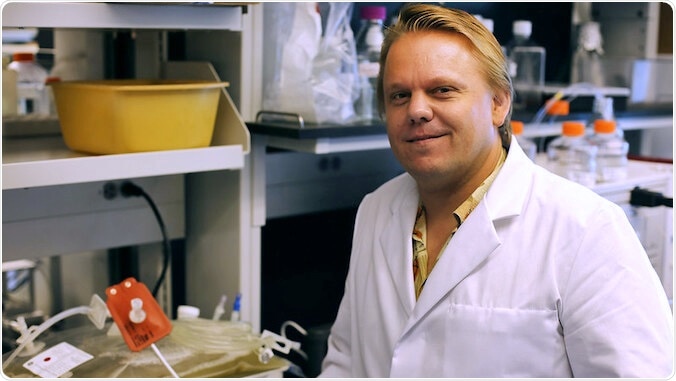The efficacy of multiple vaccine candidates that target three filoviruses responsible for life-threatening infections to humans—Ebola virus, Sudan virus, and Marburg virus—has been demonstrated in monkeys by scientists from the University of Hawaiʻi at Mānoa John A. Burns School of Medicine (JABSOM).

Axel Lehrer in his lab at the John A. Burns School of Medicine. Image Credit: the University of Hawaiʻi at Mānoa.
The study results were reported on August 18th, 2021, in Frontiers in Immunology.
The JABSOM group was led by Associate Professor Axel Lehrer from the Department of Tropical Medicine, Medical Microbiology and Pharmacology, in collaboration on this project with late-stage biopharmaceutical company Soligenix, Inc., and with the local development partner, Hawaii Biotech, Inc.
The researchers also reported another advancement in achieving successful thermostabilization in single vials of Filovirus vaccines in Vaccine.
Filoviruses are endemic in areas of the world where the power supply can be uncertain, making a thermostable vaccine particularly valuable. Our work to date has demonstrated not only the feasibility of rapid and efficient manufacturing, but also the applicability of thermostabilization of multiple antigens with the potential for a broadly applicable and easily distributed vaccine.”
Axel Lehrer, Associate Professor, Department of Tropical Medicine, Medical Microbiology and Pharmacology, John A. Burns School of Medicine, University of Hawaiʻi at Mānoa
Lehrer’s research focused on developing shelf-stable vaccines without any need for freezing or refrigeration, which is crucial to eradicating viruses in tropical countries and enables the equitable distribution of high-demand vaccines to communities across the world.
Lehrer explained that once such a vaccine is developed, it may be able to quickly arrest emerging outbreaks, for example, the Marburg virus infection that recently emerged in Guinea.
The researchers are confident that this technology will be a significant contribution to National Institute of Allergy and Infectious Diseases Director Anthony Fauci’s proposed concept of making prototype vaccines against the top 20 viral families that may also lead to pandemics.
Having such a platform available would likely enable broader and faster worldwide vaccination campaigns addressing future health emergencies. In addition, the ability to combine antigens in the formulation also enables generation of potentially broader protective vaccines.”
Axel Lehrer, Associate Professor, Department of Tropical Medicine, Medical Microbiology and Pharmacology, John A. Burns School of Medicine, University of Hawaiʻi at Mānoa
COVID-19 vaccine update
Lehrer has also been collaborating with Soligenix, since March 2020, to develop a potential thermostable COVID-19 vaccine.
While much progress has been made since the initial announcement of our collaborative research, we are actively working on further analysis if the neutralizing potential of the vaccine candidate against a number of virus variants.”
Axel Lehrer, Associate Professor, Department of Tropical Medicine, Medical Microbiology and Pharmacology, John A. Burns School of Medicine, University of Hawaiʻi at Mānoa
The researchers have been developed the vaccine using the same thermostable platform that was used for filovirus vaccines and has shown potential outcomes in mice and non-human primates.
Source:
Journal reference:
Lehrer, A. T., et al. (2021) Recombinant Protein Filovirus Vaccines Protect Cynomolgus Macaques From Ebola, Sudan, and Marburg Viruses. Frontiers in Immunology. doi.org/10.3389/fimmu.2021.703986.